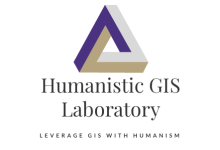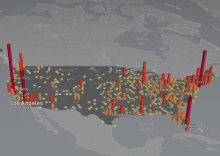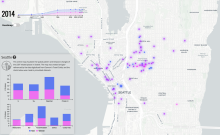Thank you very much to Geography Interim Administrator Kendall Nelson for contributing this article!
Since joining the Department of Geography in autumn 2019, Professor Bo Zhao has been creating opportunities for both undergraduate- and graduate students to engage in collaborative, cutting edge research. Professor Zhao is the founder and director of the Humanistic GIS (geographic information systems) Laboratory, a space for exploring “Digital Earth as the home of humankind.” The HGIS Lab, as it has become known, was developed as a means of (1) exploring innovative methodologies to improve geospatial technologies with the consideration of human experience, (2) reflect upon the social implications of maps, geovisualization, and other geospatial technologies, and (3) to geo-narrate a variety of geographic phenomena, especially those related to vulnerable populations.
Professor Zhao started the lab with the intention of expanding UW’s GIS program through collaboration with the local data science sector and entities using geospatial technologies. The HGIS lab is proud to have partnered with Tableau, Google, Microsoft, and Amazon. Professor Zhao decided to take on a leadership role as a means of expanding the range of opportunities for scholars and students. The HGIS Lab has several unique characteristics which have caused it to be ranked among other major GIS organizations in the United States and abroad.
Research by the HGIS Lab illustrates the practical applications of GIS technology relating to humanistic research. The HGIS Lab has used geospatial technology to help amplify the voices and concerns of local, marginalized communities. In recent years, the HGIS lab has worked with several organizations to conduct research in support of Black restaurant owners and unhoused communities in Seattle. The HGIS group holds quarterly gatherings and meets regularly in Smith Hall 406A to conduct their research.
The HGIS Lab currently consists of a faculty member, an industrial member from Tableau, four graduate students, and six undergraduate students. Lab researchers come from a diverse range of fields including geography, urban planning, and the iSchool.
The students in the HGIS Lab have a strong interest in spatial data science and aim to utilize their GIS- and data-driven skills in geographical research. Moreover, they prioritize the integration of humanistic values such as care, empathy, and humility in their research. The lab provides an environment for these students to hone their skills, expand their knowledge, and refine their career aspirations. are engaged in several projects funded by the NSF, industrial leaders such as Samsung/Joule, and internal funds from UW. are engaged in several projects funded by the NSF, industrial leaders such as Samsung/Joule, and internal funds from UW.
The HGIS Lab is currently providing support for two NSF projects (one on shifting lgbqt+ spaces, the other on storytelling Cascadian science), one NIH project (on COVID-19 patient critical facilities), and have published several highly impactful papers, such as the one on black-owned restaurants co-authored by [Geography Graduate Student] Steven Bao and Professor Zhao. Recently, the lab hosted a successful in-person round table discussion on geospatial AI, which was well attended by students and faculty from UW. The event included panelists from the University of Minnesota and University of Georgia faculty, as well as Ph.D. students from Technische Universität München in Germany and engineers from Google. When asked about the lab’s successes, Dr. Zhao noted the benefits his students have received for their work at the lab.
Approximately 70% of the HGIS lab's undergraduate members receive compensation for their work. The lab hopes to increase that number and is actively seeking funding to support those who volunteer. Additionally, Professor Zhao has observed that HGIS Lab graduates have been successful in securing employment and pursuing advanced graduate studies. Most lab graduates are accepted into highly regarded GIS or data science programs around the country. For example, the 2022-2023 undergraduate cohort received graduation admission and fellowship offers from the geography program at University of Wisconsin, Madison, the data science related programs at Duke University, Northwestern University and the iSchool at UW. With all of these successes, Professor Zhao has high hopes for the lab’s future.
The lab intends to increase their support of local communities using geospatial technology as a means of amplifying their voices and concerns. Professor Zhao hopes to continue to develop the HGIS Lab’s connections with the geospatial technologies sector in the Puget Sound. Additionally, he would like to increase the number of talks given by GIS scholars and industry leaders. The lab would like to continue to develop processes which support geography and GIS students in pursuing their career after graduation.


